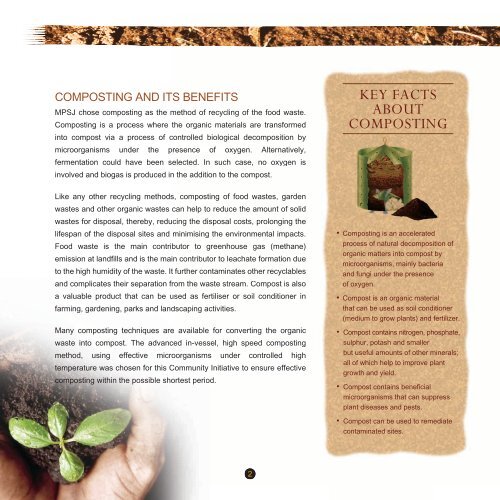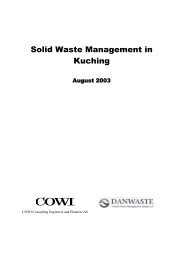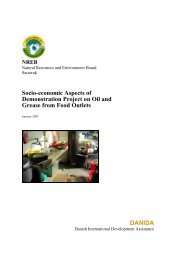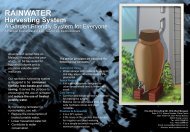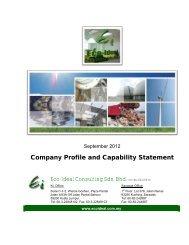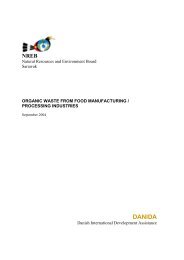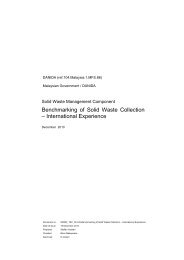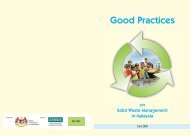source separation of food waste - turning waste into compost
source separation of food waste - turning waste into compost
source separation of food waste - turning waste into compost
Create successful ePaper yourself
Turn your PDF publications into a flip-book with our unique Google optimized e-Paper software.
COMPOSTING AND ITS BENEFITS<br />
MPSJ chose <strong>compost</strong>ing as the method <strong>of</strong> recycling <strong>of</strong> the <strong>food</strong> <strong>waste</strong>.<br />
Composting is a process where the organic materials are transformed<br />
<strong>into</strong> <strong>compost</strong> via a process <strong>of</strong> controlled biological decomposition by<br />
microorganisms under the presence <strong>of</strong> oxygen. Alternatively,<br />
fermentation could have been selected. In such case, no oxygen is<br />
involved and biogas is produced in the addition to the <strong>compost</strong>.<br />
Like any other recycling methods, <strong>compost</strong>ing <strong>of</strong> <strong>food</strong> <strong>waste</strong>s, garden<br />
<strong>waste</strong>s and other organic <strong>waste</strong>s can help to reduce the amount <strong>of</strong> solid<br />
<strong>waste</strong>s for disposal, thereby, reducing the disposal costs, prolonging the<br />
lifespan <strong>of</strong> the disposal sites and minimising the environmental impacts.<br />
Food <strong>waste</strong> is the main contributor to greenhouse gas (methane)<br />
emission at landfills and is the main contributor to leachate formation due<br />
to the high humidity <strong>of</strong> the <strong>waste</strong>. It further contaminates other recyclables<br />
and complicates their <strong>separation</strong> from the <strong>waste</strong> stream. Compost is also<br />
a valuable product that can be used as fertiliser or soil conditioner in<br />
farming, gardening, parks and landscaping activities.<br />
Many <strong>compost</strong>ing techniques are available<br />
for converting the organic<br />
<strong>waste</strong> <strong>into</strong> <strong>compost</strong>. The advanced in-vessel, high speed <strong>compost</strong>ing<br />
method, using effective microorganisms s under controlled high<br />
temperature was chosen for this Community Initiative to ensure effective<br />
<strong>compost</strong>ing within the possible shortest period.<br />
KEY FACTS<br />
ABOUT<br />
COMPOSTING<br />
• Composting is an accelerated<br />
process <strong>of</strong> natural decomposition <strong>of</strong><br />
organic matters <strong>into</strong> <strong>compost</strong> by<br />
microorganisms, mainly bacteria<br />
and fungi under the presence<br />
<strong>of</strong> oxygen.<br />
• Compost is an organic material<br />
that can be used as soil conditioner<br />
(medium to grow plants) and fertilizer.<br />
• Compost contains nitrogen, phosphate,<br />
sulphur, potash and smaller<br />
but useful amounts <strong>of</strong> other minerals;<br />
all <strong>of</strong> which help to improve plant<br />
growth and yield.<br />
• Compost contains beneficial<br />
microorganisms that can suppress<br />
plant diseases and pests.<br />
• Compost can be used to remediate<br />
contaminated sites.<br />
2


